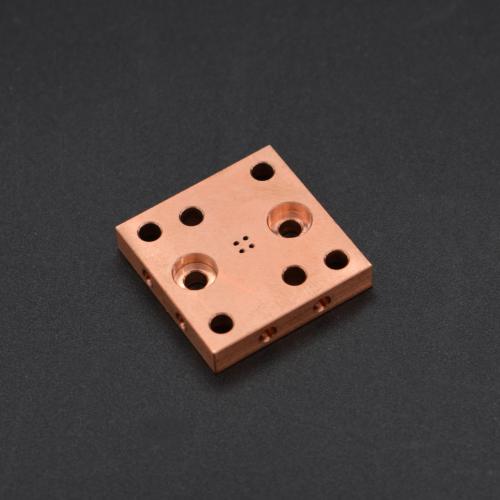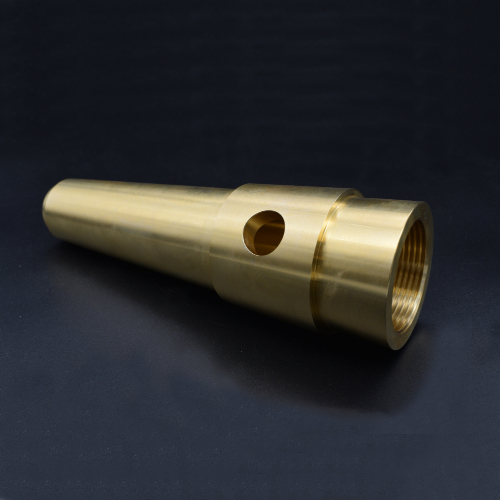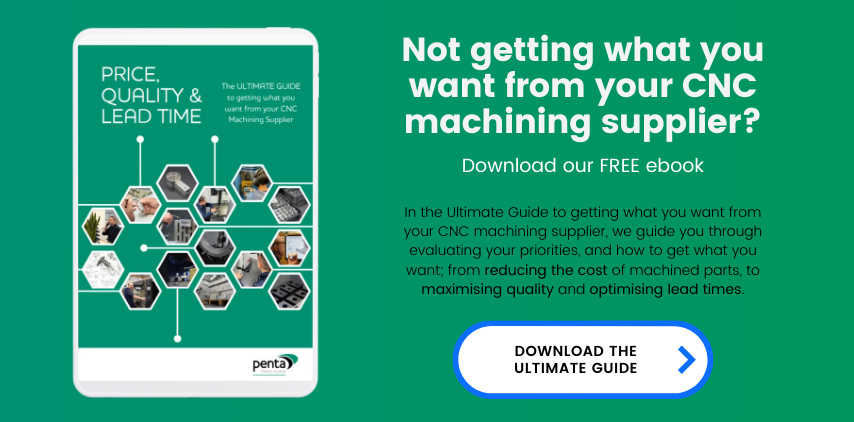Copper vs Brass: which is the best material for your next machined component?
6th Feb 2024 by Luke Malson
by Luke Malson
Copper or brass? Brass or copper? If you’re in a quandary about which of these two yellow metals to choose for your CNC machined component, you’re not alone. Here at Penta, we encounter many specifiers and designers who are faced with the same predicament.
Have no fear! In this blog, I’m bringing you the lowdown on these two excellent options and will help you compare them side by side.
Let’s dive in…
Copper: an overview

Copper, in its pure form (grade C101), is best known for its exceptional electrical and thermal conductivity which makes it ideal for electrical components, heat sinks, and other applications requiring efficient energy transfer.
It also has excellent mechanical properties including high strength which makes it suitable for high-stress applications where durability is crucial.
However, all these superior properties do come with a trade-off, okay two trade-offs.
The raw material comes at a premium. It’s also worth noting that the price does fluctuate so quotes are generally only valid for around a week.
The second trade-off relates to cost too. Copper has a reputation for being challenging to machine compared to other metals which requires a higher level of expertise, can take more time, and ultimately adds to the cost.
A machinist experienced in working with copper will know all the ways to get the best out of this material including thoroughly cleaning tooling and work surfaces to prevent cross-contamination which may affect corrosion resistance. They will also opt for appropriate feeds and speeds to allow for efficient removal of swarf.
Brass: an overview

Brass, an alloy of copper and zinc, has high tensile strength, and also offers good corrosion resistance and conductivity.
As well as use in electronics applications, brass is also used within fluid power and instrumentation.
What brass is perhaps best known for (particularly the European standard brass grade CZ121) is its machinability.
In fact, brass CZ121 has 100% machinability rating and is regarded as the ‘standard’ against which all other materials’ machinability is judged and rated. For parts that demand tight tolerances and a clean finish, choosing a reliable brass machining partner can help ensure consistent results and efficient production.
Like copper, the price of brass can fluctuate so prices are generally only valid for around a week. While more expensive than other metals, brass is cheaper than copper.
Copper vs brass
The properties of copper and brass depend on the grade in question. We work closely with the common copper C101 and brass CZ121 so we have compared them in this table.
|
|
Copper |
Brass |
|
Composition |
Pure copper |
Copper and zinc alloy |
|
Machinability |
Fair |
Excellent |
|
Appearance |
Orange-red colour |
Yellow colour |
|
Cost |
Higher |
Lower |
|
Corrosion resistance |
Excellent |
Good |
|
Electrical conductivity |
Excellent |
Moderate |
|
Ductility |
Excellent |
Good |
|
Tensile strength |
200-360 MPa |
360-500 MPa |
Selecting the optimal metal for your project
The choice between copper and brass ultimately depends on the specific requirements of your project. If electrical conductivity is a top priority, copper might be a better option, even with the added costs associated with buying and machining it. If you are bound by tight budgets or timelines, and can afford to compromise on conductivity, brass can be a great alternative.
Get expert guidance on material selection
Choosing the right material is not a decision to be taken lightly. It’s vital to consider the specific needs of your application along with your budget and project timelines.
Some CNC machining companies offer a Design for Manufacture (DFM) service. This involves an expert analysing your drawings, talking to you about what you need from the component and providing recommendations for manufacturability including material selection. While this kind of service does involve a financial investment, it has the potential to cut the costs of manufacturing your component.
Take action
Here at Penta, we are proud of the DFM service we offer. Our team are highly experienced in working with both copper and brass, and adept at helping you select the most appropriate material for your CNC machined parts. You can find out more about our DFM service here or get in touch for a no-obligation chat – call 023 9266 8334 or email .
If you’re still in the early research stage, our materials resources hub is a great place to research and compare materials.

